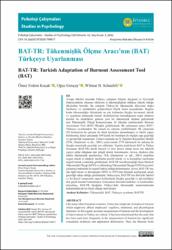| dc.contributor.author | Koçak, Ömer Erdem | |
| dc.contributor.author | Gençay, Oğuz | |
| dc.contributor.author | Schaufeli, Wilmar B. | |
| dc.date.accessioned | 2023-06-21T10:12:01Z | |
| dc.date.available | 2023-06-21T10:12:01Z | |
| dc.date.issued | 2022 | en_US |
| dc.identifier.citation | Koçak, Ö. E., Gençay, O. ve Schaufeli, W. B. (2022). BAT-TR: Tükenmişlik Ölçme Aracı’nın (BAT) Türkçeye uyarlanması. Psikoloji Çalışmaları (Online), 42(3), 509-549. https://dx.doi.org/10.26650/SP2020-799817 | en_US |
| dc.identifier.issn | 1304-4680 | |
| dc.identifier.issn | 2602-2982 | |
| dc.identifier.uri | https://dx.doi.org/10.26650/SP2020-799817 | |
| dc.identifier.uri | https://hdl.handle.net/20.500.12511/11115 | |
| dc.description.abstract | Avrupa ülkeleri arasında Türkiye, çalışanın bilişsel, duygusal ve fizyolojik fonksiyonlarını olumsuz etkileyen iş tükenmişliğinin oldukça yüksek olduğu ülkelerden birisidir. Bu anlamda Türkiye’de tükenmişlik düzeyinin doğru ölçülmesi ve müdahaleler geliştirilmesi büyük önem taşımaktadır. Bugüne kadar tükenmişliğin ölçümünde en çok kullanılan ölçeğin kavramsal, teknik ve uygulama anlamında önemli eksikliklerinin bulunduğunun tespit edilmesi üzerine bu eksiklikleri gideren yeni bir tükenmişlik ölçümü geliştirmek için Tükenmişlik Ölçeği Konsorsiyumu 26 ülkeden katılımcılarla Burnout Assessment Tool (BAT) Ölçeğini geliştirmiştir. Bu çalışmanın amacı BAT’ı Türkçeye uyarlamaktır. Bu amaçla üç çalışma yürütülmüştür. İlk çalışmada 295 katılımcılı bir çalışma ile ölçek tercümesi tamamlanmış ve faktör yapısı belirlenmiş, ikinci çalışmada 399 kişilik bir örneklem ile ölçeğin yapı geçerliği ve güvenirliği sınanmıştır. Üçüncü aşamada ise İş Talepleri-Kaynakları Modeli (İT-K, Demerouti ve ark., 2001) çerçevesinde 2778 katılımcılı bir çalışma ile ölçeğin nomolojik geçerliği test edilmiştir. Yapılan analizlerde BAT’ın Türkçe formunun (BAT-TR) dördü birincil ve ikisi ikincil olmak üzere altı faktörlü yapıya sahip olduğuna dair görgül destek bulunmuştur. Ayrıca, ölçekten elde edilen tükenmişlik puanlarının, İT-K (Demerouti ve ark., 2001) modeline uygun olarak iş talepleri tarafından pozitif olarak ve iş kaynakları tarafından negatif olarak yordandığı görülmüştür. BAT-TR’nin tükenmişliği ölçen Maslach Tükenmişlik Ölçeği (MTÖ) ve Oldenburg Tükenmişlik Ölçeği (OTÖ) ile pozitif, çalışmaya tutkunluk ile negatif ilişkisi olduğu bulunmuştur. Ayrıca, BAT-TR’nin, işle ilgili tutum ve davranışları MTÖ ve OTÖ’nün ötesinde açıklayarak artışlı geçerliğe sahip olduğu görülmüştür. Dolayısıyla, BAT-TR’nin dört kök faktörü ve iki ikincil semptomlu yapısı kullanılarak ölçeğin geçerliği ve güvenirliğine dair güçlü kanıtlar bulunmuştur. Çalışmanın literatüre katkıları ve kısıtlamaları tartışılmış, BAT-TR ölçeğinin Türkiye’deki tükenmişlik araştırmalarında kullanılabilecek bir ölçek olduğu önerilmiştir. | en_US |
| dc.description.abstract | Like many other European countries, Turkey has a high rate of employee burnout which negatively affects employees’ cognitive, emotional, and physiological functions. In this regard, accurate measurement of burnout and the development of interventions in Turkey are critical. It has been determined that the scale that has been used most frequently in the measurement of burnout has significant conceptual, technical, and application deficiencies. Thus, the Burnout Scale Consortium developed the Burnout Assesment Tool (BAT), with participants from 26 countries, to address these shortcomings. The purpose of this study is to adapt BAT to Turkish. Three studies were conducted for this purpose. First, the scale translation was completed, with the factorial structure being determined through a study of 295 participants. For the second study, the scale’s reliability and validity was tested with a study of 399 participants. For the third study, the scale’s nomological network validity was tested with a study of 2,778 participants, using the Job Demands-Resources Model (JD-R; Demerouti et al., 2001). As a result, the empirical evidence was found to support the six-factor structure, of which four are primary and two are secondary. Additionally, in line with the JD-R model (Demerouti et al., 2001), it was discovered that job demands positively predicted the scale, while job resources negatively predicted it. The BAT-TR was found to have a positive correlation with both the Maslach Burnout Inventory (MBI) and the Oldenburg Burnout Scale (OBS), but a negative correlation with work engagement. Additionally, it has been observed that, when compared to MBI and OBS, it has incremental validity for work-related attitudes and behaviors. Thus, the BAT-TR four core factors and two secondary symptoms provide strong evidence for the validity and reliability of the Turkish form. A discussion is presented with contributions to the literature and the study’s limitations, suggesting that the BAT-TR scale can be used in burnout research in Turkey. | en_US |
| dc.language.iso | tur | en_US |
| dc.rights | info:eu-repo/semantics/openAccess | en_US |
| dc.rights | Attribution-NonCommercial 4.0 International | * |
| dc.rights.uri | https://creativecommons.org/licenses/by-nc/4.0/ | * |
| dc.subject | Tükenmişlik | en_US |
| dc.subject | BAT | en_US |
| dc.subject | Türkçeye Uyarlama | en_US |
| dc.subject | BAT-TR | en_US |
| dc.subject | Burnout | en_US |
| dc.subject | BAT | en_US |
| dc.subject | Adaptation Into Turkish | en_US |
| dc.title | BAT-TR: Tükenmişlik Ölçme Aracı’nın (BAT) Türkçeye uyarlanması | en_US |
| dc.title.alternative | BAT-TR: Turkish adaptation of Burnout Assessment Tool (BAT) | en_US |
| dc.type | article | en_US |
| dc.relation.ispartof | Psikoloji Çalışmaları (Online) | en_US |
| dc.department | İstanbul Medipol Üniversitesi, İşletme ve Yönetim Bilimleri Fakültesi, Uluslararası Ticaret ve Finansman Bölümü | en_US |
| dc.authorid | 0000-0002-4649-2042 | en_US |
| dc.identifier.volume | 42 | en_US |
| dc.identifier.issue | 3 | en_US |
| dc.identifier.startpage | 509 | en_US |
| dc.identifier.endpage | 549 | en_US |
| dc.relation.publicationcategory | Makale - Uluslararası Hakemli Dergi - Kurum Öğretim Elemanı | en_US |
| dc.identifier.doi | 10.26650/SP2020-799817 | en_US |
| dc.institutionauthor | Koçak, Ömer Erdem | |
| dc.identifier.wos | 001075078100001 | en_US |
| dc.identifier.trdizinid | 1168698 | en_US |



















